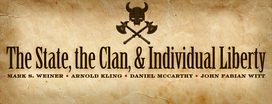Lead Essay
Mark S. Weiner argues that, while the state does often destroy individual liberty, an even greater danger lies in the rule of the clan. Clan-based societies have been found throughout the world, in many different times and places. In general they have been highly resilient, successful at replicating themselves – and markedly illiberal. Individual freedom may need a strong central state after all, one that can provide the rule of law, enforce contracts, and suppress clan-based feuds and prejudices. Without the state, we may find ourselves regressing from an egalitarian society of contract to a hierarchical society of status. Liberals of all persuasions, including classical liberals, should beware this outcome.
Response Essays
Arnold Kling argues that human beings require institutions to interact on the basis of trust and cooperation. Kling argues that the resurgence of the clan is possible but unlikely in Anglo-American societies because the nuclear family rather than the clan is our distinctive form of non-state order. Kling concludes that the natural individualism fostered by the nuclear family makes prospects bright for shrinking the state without the risks of clannism. He calls on libertarians to advocate institutions that would accomplish this task.
Daniel McCarthy argues that all political activity takes place in collectives and in the organizations they create. As a result, even liberal societies are never all that far away from the rule of the clan. Clannishness, rather than individualism, is the rule in politics, and it probably always will be. To McCarthy’s way of thinking, even voting is a clan ritual; his viewpoint gains credibility when we consider that individualist analysis of voting is hard pressed to explain the act at all. The paradox of rule is that, to secure one’s rights, one must participate in government, but that requires committing to a group, an act that necessarily has an illiberal dimension.
John Fabian Witt argues that Mark Weiner raises a fundamental question about the function of the state. Witt argues that a distinctive feature of the state is its fragility as a stopping point between the small kin group on the one hand and empire or world government on the other. The state seemingly forgoes both the primordial attraction of the kin group and the philosophically seductive vision of empire. While agreeing with Weiner about the state’s vulnerability, Witt is more skeptical of the claim that the state is naturally conducive to liberal values. Defenders of the state, Witt concludes, would do well to refocus on the precise character of the community the state defines.
Coming Up
Discussion to follow throughout the month.
Related at Cato
Cato Unbound: “From Scratch: Libertarian Institutions and Communities,” April 2009.
Cato Unbound: “Who Needs Government? Pirates, Collapsed States, and the Possiblity of Anarchy,” August 2007.

